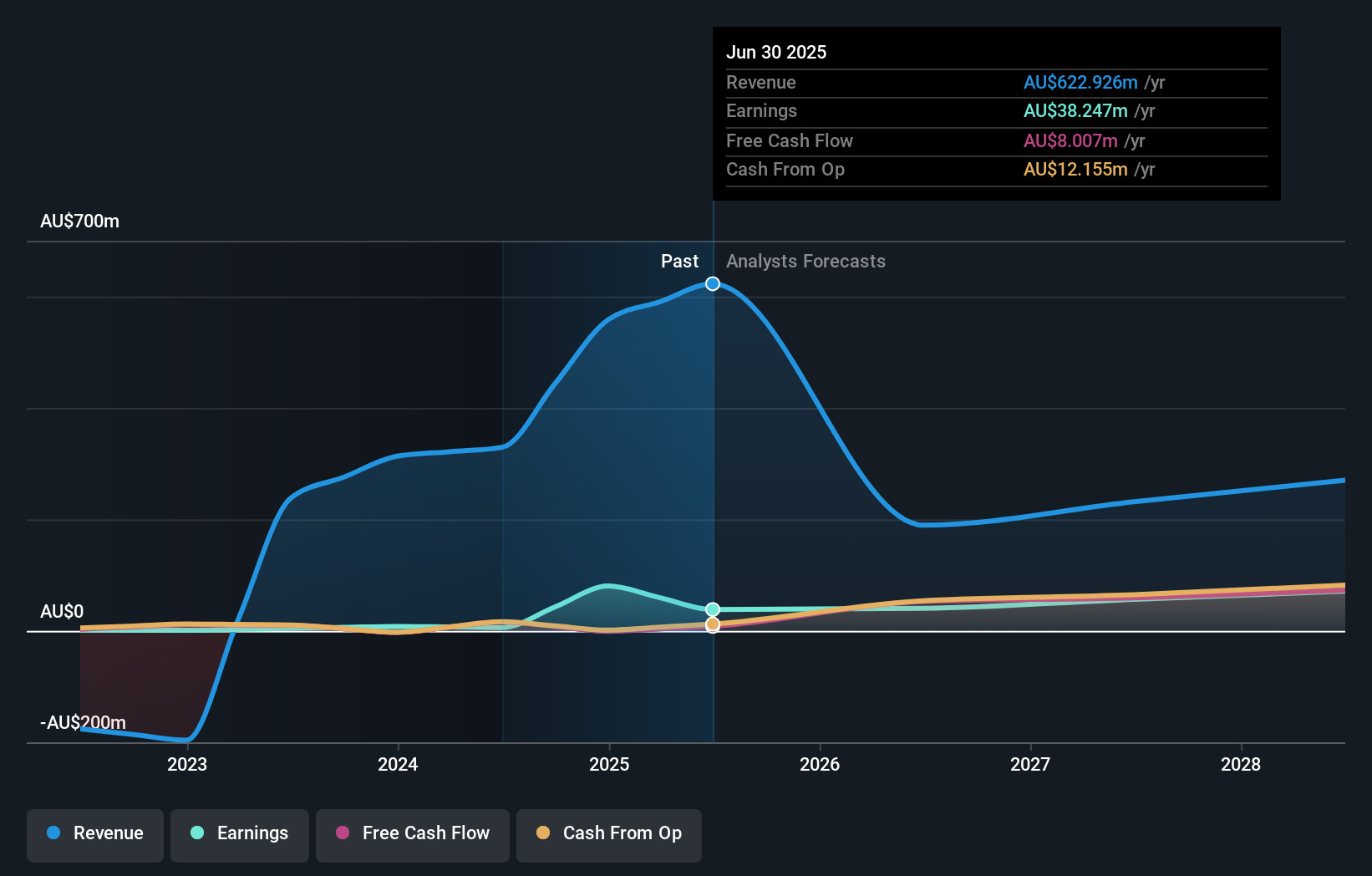Generation Development Group Limited's (ASX:GDG) 8.1% loss last week hit both individual investors who own 58% as well as institutions
Key Insights
- Significant control over Generation Development Group by individual investors implies that the general public has more power to influence management and governance-related decisions
- The top 25 shareholders own 41% of the company
- Insiders have been selling lately
If you want to know who really controls Generation Development Group Limited (ASX:GDG), then you'll have to look at the makeup of its share registry. With 58% stake, individual investors possess the maximum shares in the company. Put another way, the group faces the maximum upside potential (or downside risk).
While institutions, who own 23% shares weren’t spared from last week’s AU$228m market cap drop, individual investors as a group suffered the maximum losses
In the chart below, we zoom in on the different ownership groups of Generation Development Group.
See our latest analysis for Generation Development Group

What Does The Institutional Ownership Tell Us About Generation Development Group?
Institutions typically measure themselves against a benchmark when reporting to their own investors, so they often become more enthusiastic about a stock once it's included in a major index. We would expect most companies to have some institutions on the register, especially if they are growing.
We can see that Generation Development Group does have institutional investors; and they hold a good portion of the company's stock. This implies the analysts working for those institutions have looked at the stock and they like it. But just like anyone else, they could be wrong. It is not uncommon to see a big share price drop if two large institutional investors try to sell out of a stock at the same time. So it is worth checking the past earnings trajectory of Generation Development Group, (below). Of course, keep in mind that there are other factors to consider, too.

Generation Development Group is not owned by hedge funds. State Street Global Advisors, Inc. is currently the company's largest shareholder with 5.3% of shares outstanding. In comparison, the second and third largest shareholders hold about 5.0% and 4.8% of the stock. Additionally, the company's CEO Grant Hackett directly holds 0.7% of the total shares outstanding.
On studying our ownership data, we found that 25 of the top shareholders collectively own less than 50% of the share register, implying that no single individual has a majority interest.
While studying institutional ownership for a company can add value to your research, it is also a good practice to research analyst recommendations to get a deeper understand of a stock's expected performance. Quite a few analysts cover the stock, so you could look into forecast growth quite easily.
Insider Ownership Of Generation Development Group
The definition of company insiders can be subjective and does vary between jurisdictions. Our data reflects individual insiders, capturing board members at the very least. Company management run the business, but the CEO will answer to the board, even if he or she is a member of it.
Most consider insider ownership a positive because it can indicate the board is well aligned with other shareholders. However, on some occasions too much power is concentrated within this group.
It seems insiders own a significant proportion of Generation Development Group Limited. Insiders own AU$495m worth of shares in the AU$2.6b company. That's quite meaningful. It is good to see this level of investment. You can check here to see if those insiders have been buying recently.
General Public Ownership
The general public -- including retail investors -- own 58% of Generation Development Group. With this amount of ownership, retail investors can collectively play a role in decisions that affect shareholder returns, such as dividend policies and the appointment of directors. They can also exercise the power to vote on acquisitions or mergers that may not improve profitability.
Next Steps:
While it is well worth considering the different groups that own a company, there are other factors that are even more important. Take risks for example - Generation Development Group has 2 warning signs (and 1 which doesn't sit too well with us) we think you should know about.
If you are like me, you may want to think about whether this company will grow or shrink. Luckily, you can check this free report showing analyst forecasts for its future.
NB: Figures in this article are calculated using data from the last twelve months, which refer to the 12-month period ending on the last date of the month the financial statement is dated. This may not be consistent with full year annual report figures.
New: Manage All Your Stock Portfolios in One Place
We've created the ultimate portfolio companion for stock investors, and it's free.
• Connect an unlimited number of Portfolios and see your total in one currency
• Be alerted to new Warning Signs or Risks via email or mobile
• Track the Fair Value of your stocks
Have feedback on this article? Concerned about the content? Get in touch with us directly. Alternatively, email editorial-team (at) simplywallst.com.
This article by Simply Wall St is general in nature. We provide commentary based on historical data and analyst forecasts only using an unbiased methodology and our articles are not intended to be financial advice. It does not constitute a recommendation to buy or sell any stock, and does not take account of your objectives, or your financial situation. We aim to bring you long-term focused analysis driven by fundamental data. Note that our analysis may not factor in the latest price-sensitive company announcements or qualitative material. Simply Wall St has no position in any stocks mentioned.
About ASX:GDG
Generation Development Group
Engages in the diversified financial service business in Australia.
Flawless balance sheet with solid track record.
Market Insights
Community Narratives


